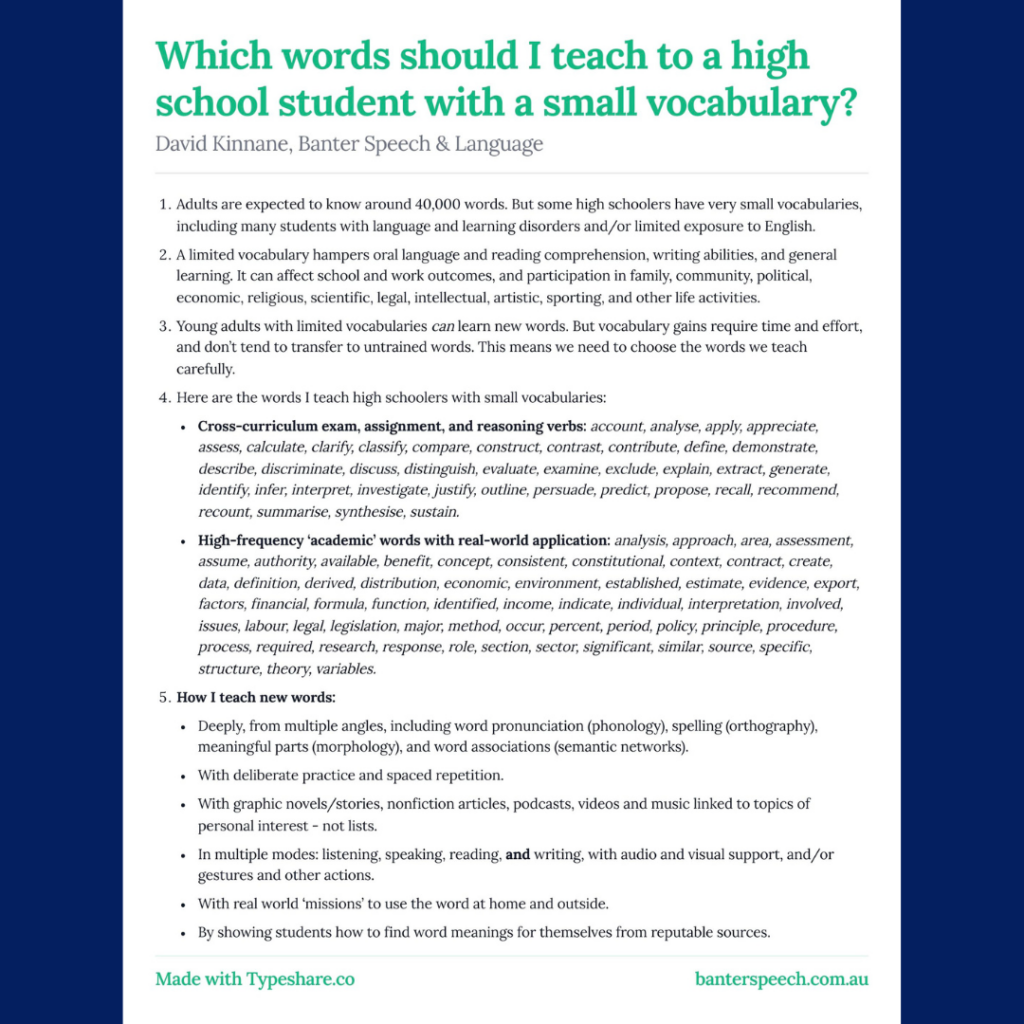With thanks to Averil Coxhead, Charles Browne, Nonie Lesaux, Sarah Spencer, Isabel Beck, and Laura Justice, here’s what I say to parents and teachers when they ask me:
- Adults are expected to know around 40,000 words. But some high schoolers have very small vocabularies, including many students with language and learning disorders and/or limited exposure to English.
- A limited vocabulary hampers oral language and reading comprehension, writing abilities, and general learning. It can affect school and work outcomes, and participation in family, community, political, economic, religious, scientific, legal, intellectual, artistic, sporting, and other life activities.
- Young adults with limited vocabularies can learn new words. But vocabulary gains require time and effort, and don’t tend to transfer to untrained words. This means we need to choose the words we teach carefully.
- Here are the words I teach high schoolers with small vocabularies:
- Cross-curriculum exam, assignment, and reasoning verbs: account, analyse, apply, appreciate, assess, calculate, clarify, classify, compare, construct, contrast, contribute, define, demonstrate, describe, discriminate, discuss, distinguish, evaluate, examine, exclude, explain, extract, generate, identify, infer, interpret, investigate, justify, outline, persuade, predict, propose, recall, recommend, recount, summarise, synthesise, sustain.
- High-frequency ‘academic’ words with real-world application: analysis, approach, area, assessment, assume, authority, available, benefit, concept, consistent, constitutional, context, contract, create, data, definition, derived, distribution, economic, environment, established, estimate, evidence, export, factors, financial, formula, function, identified, income, indicate, individual, interpretation, involved, issues, labour, legal, legislation, major, method, occur, percent, period, policy, principle, procedure, process, required, research, response, role, section, sector, significant, similar, source, specific, structure, theory, variables.
- How I teach new words:
- Deeply, from multiple angles, including word pronunciation (phonology), spelling (orthography), meaningful parts (morphology), and word associations (semantic networks).
- With deliberate practice and spaced repetition.
- With graphic novels/stories, nonfiction articles, podcasts, videos and music linked to topics of personal interest – not lists.
- In multiple modes: listening, speaking, reading, and writing, with audio and visual support, and/or gestures and other actions.
- With real world ‘missions’ to use the word at home and outside.
- By showing students how to find word meanings for themselves from reputable sources.

Related articles:
For reading, life and school success, which words should we teach our kids? How should we do it?
Five ways to help 11-14 year-old students improve their vocabularies for school and life

Hi there, I’m David Kinnane.
Principal Speech Pathologist, Banter Speech & Language
Our talented team of certified practising speech pathologists provide unhurried, personalised and evidence-based speech pathology care to children and adults in the Inner West of Sydney and beyond, both in our clinic and via telehealth.


Leave a Reply